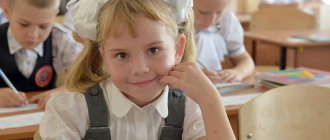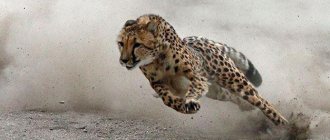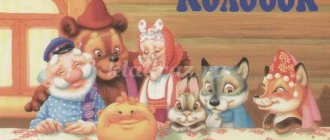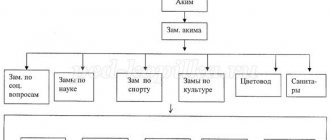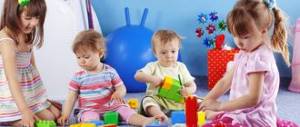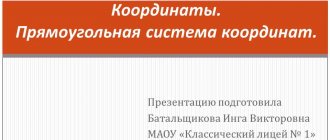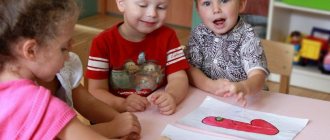Description of the work experience of a mathematics teacher
The percentage of quality of knowledge of students who passed the exam in the new form was 60%.
When organizing extracurricular activities for students, I work in three directions: mastering design and research methods of activity, participating in various competitions, involving students in elective courses and elective subjects.
In 2013, students in grades 5-6 took part in the All-Russian Distance Olympiad in Mathematics of the Infourok project, the result was that three of the children became winners and took 1-3 places.
In 2014, students in grades 5-6 took part in the All-Russian distance competition in mathematics, the “New Lesson” project, the result was that one student became a winner and took 3rd place.
Every year, 8 students take part in the All-Russian Olympiad “Biysk”, organized by a support center for talented youth. Best results of the Olympiads: 2012 – Sergey Grishin took 1st place at the regional level and 5th place in the region, 15th place in the All-Russian ranking; 2013 – Sergey Grishin took first place at the district level and ninth in the region, 17th place in the All-Russian ranking; Nikita Matveykin 14th place in the region and 23rd in the All-Russian ranking.
Under my leadership, students take part in school and regional scientific and practical conferences. Performance: in 2012, 6th grade student Ksenia Romanenko took second place in the “Mathematics” category.
In the mathematics classroom there is a collection of geometric figures made by students of different years, which I use as visual aids for teaching. The students draw up mind maps based on the educational material and then use them in preparation for final tests.
I conduct open events on the subject. The events vary in form: math games, quizzes, competitions.
She has developed programs for visual geometry and entertaining mathematics. I provide propaedeutic preparation for students to study a systematic course in geometry. The main content of the programs contributes to the intellectual, creative, and emotional development of students.
One of the priority areas of my activity is to create favorable conditions for preserving and strengthening the health of students. During the lessons I carry out preventive measures to prevent myopia, poor posture, spend physical education minutes, and change methods of activity 3-4 times per lesson.
A comfortable psychological atmosphere in the classroom is created when
the help of feasible tasks, presentation of the material accessible to each student and an individual approach. Everyone can feel valued, gifted and talented! I use multi-level tasks. Assignments allow the child to be successful, which means he will enjoy learning.
During extracurricular hours I spend class hours on the topics: “On the benefits of sleep”, “How to live long young and healthy”, “Building a home for your health”, a test - a questionnaire for schoolchildren to self-assess risk factors for deterioration in health, I involve schoolchildren in sports sections and sports clubs and schools. In the class, 85% of students attend sports sections. Repeatedly participate and win sports competitions at the school and district levels.
Throughout all the years of work at the municipal budgetary educational institution Filimonovskaya secondary school, I have been a class teacher. In educational work with the class, I give priority to the disclosure of children’s individual abilities, health-preserving activities, civic-patriotic, professional-oriented education.
In the new team (6th grade), a favorable psychological climate, an atmosphere of camaraderie, mutual assistance, and tolerance was formed. Students are active participants in all school events; they prepared and conducted events using computer technology: events for Cosmonautics Day “The First Cosmonaut”, the intellectual game “What? Where? When?”, Self-Government Day, a theatrical performance at the New Year’s holiday, as well as the “Fun Starts” sports competitions.
In the process of activity, I conduct diagnostics (class teacher) and self-diagnosis (child). Based on the results of each student, a class development map is drawn up. I determine at what level of education each student is, to what extent and in relation to what areas of life at the moment this or that student can show independence, initiative, regulate activities himself, and who with help and support.
Next, I compile a description of the class “What do we have?” and determine the goals and objectives of the educational process “What do we want?” I plan forms of activity that allow me to solve the assigned tasks. I organize joint activities and analyze them. I use the results of the analysis to adjust my future activities. All this helps take the team to a higher level. I have three graduations from teaching (2000, 2007 and 2011) and now I have the moral right to say: “My efforts have borne fruit.” Graduate teams are united, with an interesting inner life, with rich intellectual and creative capabilities. Classes of interesting personalities, classes with personality.
For a number of years, she was the head of the school methodological association of natural science teachers. All members of the association actively participated in the work of the regional methodological association; 100% of the members of the association underwent retraining in advanced training courses. I organize the participation of the school team in the annual municipal intellectual competition in mathematics “Braining”. The boys take an honorable second place. This year Sergey Grishin became the best theorist and was awarded a diploma. I take part in the work of the RMO of mathematics teachers.
I conduct open lessons where I demonstrate the ability to use modern pedagogical technologies and extracurricular activities using ICT in my teaching activities. In 2014, I taught a lesson on critical thinking technology: I followed the lesson structure and used various technology techniques. Used an interactive whiteboard and interactive products.
At the district level, she spoke at a methodological meeting on the topic “Technology of critical thinking: lesson structure and its techniques.”
I have a publication at the regional level - a collection: “Features of teaching mathematics in the context of a competency-based approach”, materials of the international scientific and practical conference, Krasnoyarsk, 2009, article: “Features of teaching mathematics to children with signs of giftedness.”
Participated in the regional August pedagogical council “New standards and assessment of the quality of education”, 2012: Master classes “Solving the problems of food conservation within the framework of the Federal State Educational Standard of the National Educational Institution”, “School system for assessing the results of the educational process”, “Organization of physical and mathematical training of students”.
I provide the following information about myself: higher education, Krasnoyarsk Pedagogical Institute, Faculty of Mathematics; 28 years of teaching experience, 24 years in this institution; awards - a letter of gratitude from the Legislative Assembly of the Krasnoyarsk Territory, for many years of conscientious work and high results in teaching activities; participation - regional August pedagogical council "New standards and assessment of the quality of education", international scientific and practical conference, speech on the topic "Features of teaching mathematics to children with signs of giftedness", 2009, Krasnoyarsk, seminars for school and district teachers; advanced training courses - “Psychological and pedagogical aspects of teaching children in correctional classes of 7 and 8 types” (2011) and “Methods of teaching visual geometry to students in grades 5-6. Development of professional competence of teachers implementing the requirements of the Federal State Educational Standard (2014).
" " September 2014 (tel. no. 89131772890)
signature
How to teach children to study? (from the experience of a mathematics teacher)
(From the experience of mathematics teacher Mitrofanova E.A.)
Do you often face the problem of students’ inability to show their own knowledge? The test results turn out to be worse than the students’ answers in class, even for students who do well in the subject.
According to research, the results of tests to test the ability to use their knowledge in practice showed that Russian schoolchildren:
- do not know how to apply knowledge in real situations typical of everyday life;
- demonstrate underdeveloped spatial thinking, which is of great practical importance;
- do not know how to interpret quantitative information provided in a form typical for the media.
For our students, the most difficult tasks were of an applied nature:
- to evaluate and estimate the result;
- for interest payments;
— to construct diagrams;
— to assess the measurement accuracy;
- relationship tasks.
Solving the problems of the course “Elements of Statistics”, namely
- introduce students to statistical characteristics, focusing on their practical meaning;
- teach how to find statistical characteristics, work with them, visually depict the results of statistical studies and extract information from relevant pictures and drawings;
- develop the ability to independently work on receiving and processing information.
I did the following work in the 7th and then in the 8th grade.
In 7th grade. Each student was given a task (each his own).
For example, find out what the price of 1 kg of oranges is in different stores, how many flowers are in different classrooms, what is the mass of students’ portfolios, how much time does a student spend on doing math homework during the 1st week, what is the air temperature at a certain point in time during weeks, what grades boys and girls have in subjects for the quarter, etc.
After studying the topic in class, independent work was carried out to find the main statistical characteristics and explain what they show.
In the 8th grade, homework was carried out on the topic “Sociological research”.
Each student was offered an individual task: to conduct a survey among students in the class
- Zodiac signs
- favourite drink
- time spent traveling to school
- favorite fruit
- number of family members living in one apartment
- favorite sport
- where will I spend the summer
- favorite lesson, etc.
In the process of studying the topic, the children were given a plan according to which they would draw up their work (collecting information, compiling tables, visualizing information, drawing conclusions). Knowing the ultimate goal, for which he would receive a grade, everyone tried to understand the topic as much as possible.
Thus, children learn to obtain and apply acquired knowledge in practice.
So that the children are not trained to mechanically memorize facts, so that they know what to do with their skills acquired after studying the topic, I try to involve students in creative search work. For example, play the role of exercise creators.
I taught the final lesson on the topic “Linear Function” in the form of a competition.
Before the lesson, homework was given to come up with various questions and exercises where a function appears, for example y=-2x+5.
The class was divided into 2 teams. The teams asked each other prepared questions (types of questions should not be repeated), selected different respondents each time (in order to involve a larger number of respondents), and assistance from the team was expected - these are organizational issues. But here it is important that, while preparing, the guys had to go through all the tasks, match their data to the proposed function, and solve in order to know the answer to their question.
Tasks: build a graph; construct a graph of direct proportionality parallel to a given line; answer the question whether a given line passes through a given point; find the point of intersection of lines; find one of the coordinates of a point on a line if the other is known, etc.
Geometry knowledge accumulates and is all necessary when studying subsequent topics. The children have difficulty solving problems. To help them navigate the acquired knowledge, I carried out the following work.
During repetition lessons in 7th grade, the boys and I created a reference book. This work was carried out gradually, not in one lesson, and was preceded by appropriate homework, which was checked, discussed, corrected by me and written down by everyone in a special notebook.
The following pages were created:
- Figures, symbols, types
- Equal segments if...
- Equal angles if...
- It is known that…
- Isosceles triangle
- Equilateral triangle
- Equality of triangles
In the 8th grade we further developed it while studying the topic “Quadrilaterals”.
To check students’ residual knowledge, I do it at the beginning of the quarter, and if it’s the 2nd, 3rd or 4th, then I can do a little independent work in the 1st lesson. I give ratings at will.
It is important to know how firmly the students’ knowledge is established, and the students themselves are given the opportunity to fill in the gaps (later they write this independent work for a mandatory assessment) if they believe that they are capable of more, i.e. the guys self-assess their capabilities.
Another problem I face is doing homework. In grades 8-9, homework is checked randomly, but I want the kids to do it systematically and take it more seriously.
Classes are different, so the approach to monitoring homework is different.
In one class I randomly check homework (Row I, Option II, or by name). At the end of the quarter I give an overall grade.
In another class, where the problem of doing homework was very acute, I or one of the students pulled out a card from a bag with the number of the student who should submit the homework for testing and receive a grade in the journal.
Math Teacher Skills
The teacher’s resume indicates the skills and knowledge acquired in this professional path, as well as experience in tutoring and individual lessons with children. Teaching methods, requirements for the Unified State Examination and the Unified State Examination change every year. The teacher must be aware of innovations.
Key professional skills for a mathematics teacher for a resume:
- Excellent knowledge of the theory of the subject;
- Ability to solve practical problems;
- Social competence;
- Ability to select effective techniques and technologies for learning effectiveness;
- Use of a PC;
- Elective courses;
- Organization of mathematical competitions, etc.
Mathematics methodologists are an integral part of the pedagogical process.
These specialists develop and improve new pedagogical methods. The main requirements for the position of methodologist: excellent specialized knowledge, analytical mind, organizational skills, desire for constant development. This position requires extensive experience. Key skills for a math teacher:
| Federal State Educational Standard | Open lessons |
| Electronic manuals and textbooks | Cool tutorial |
| Use of ICT | Preparation for the OGE and the Unified State Exam |
| Preparation for VSOS | Math software |
| Basics of Psychology | Elective courses |
| Method of teaching | Extracurricular activities |
| Educational excursions | Methodological material |
| Electronic journal | Work programs |
